| Name: | Mouse monoclonal antibody to human Ki67 |
| Immunogen: | Recombinant construct containing the 2nd, 3rd and 4th Ki67 repeats of the human sequence (amino acids 1,111-1,490) expressed in and purified from E. coli. |
| HGNC Name: | MKI67 |
| UniProt: | P46013 |
| Molecular Weight: | 345kDa, 395kDa |
| Host: | Mouse |
| Isotype: | IgG1 |
| Species Cross-Reactivity: | Human, no reactivity with rat or mouse |
| RRID: | AB_2637051 |
| Format: | Purified antibody at 1mg/mL in 50% PBS, 50% glycerol, 5mM azide |
| Applications: | WB, IF/ICC |
| Recommended Dilutions: | WB: 1:1,000-5,000. IF 1:2,000-5,000 |
| Storage: | Stable at 4°C for one year, for longer term store at -20°C |
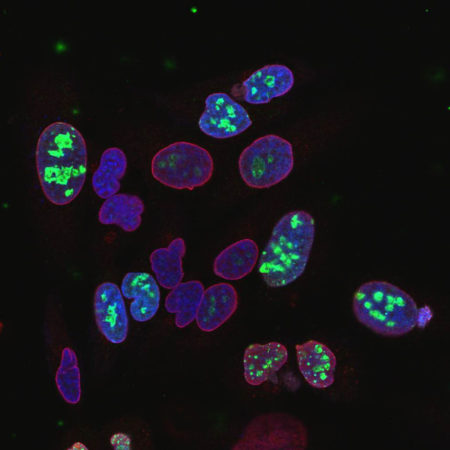
Confcoal immunofluorescence image at high magnification of HeLa cell culture stained with mouse monoclonal antibody to Ki-67, MCA-6B4, in green, and costained with chicken polyclonal antibody to Lamin A/C, CPCA-LaminAC, in red. The antibody against Ki67 stains the nuclei of rapidly dividing cells within their nucleoli, but doesn’t stain nearby quiescent cells. The antibody against Lamin A/C stains nuclear lamina. The blue is DAPI staining of nuclear DNA.
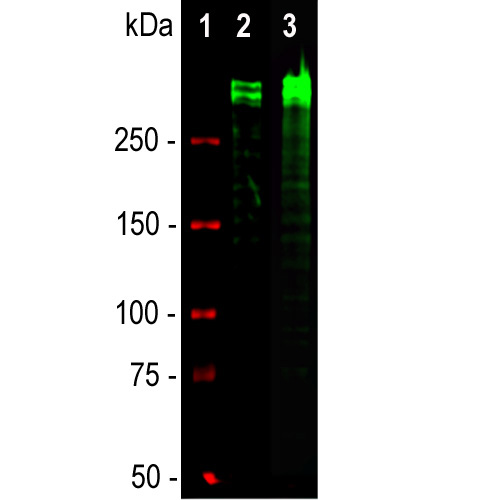
Western blot analysis of equal amounts of cell lysates using mouse mAb to Ki67, MCA-6B4, dilution 1:2,000, in green: [1] protein standard (red), [2] rapidly dividing HeLa cell cultures, [3] rapidly dividing HEK293 cell cultures. Strong double bands above 250kDa correspond to the two major Ki67 isoforms of apparent molecular weight of 345kDa and 395kDa. Smaller proteolytic fragments of these isoforms are also invariably detected on the blot.
Mouse Monoclonal Antibody to Human Ki67, Ki-67
Cat# MCA-6B4
$120.00 – $800.00
The Ki67 proteins were first discovered in an attempt to generate cancer specific monoclonal antibodies (1). A monoclonal antibody which bound to structures in the nuclei of dividing but not quiescent cells was produced and shown to bind two very large proteins of molecular weight 345kDa and 395kDa. The two proteins were derived from alternate transcripts of a single gene. The presence of Ki67 proteins, detected with an appropriate antibody, is an indicator of cell proliferation and the level of Ki67 expression is one of the most reliable biomarkers of proliferative status of cancer cells (2-7). Recent studies show that Ki67 coats dividing chromosomes and ensures that each one enters the appropriate daughter cell (8). The MCA-6B4 monoclonal antibody was raised against a recombinant construct containing the second, third and fourth of the sixteen ~110 amino acid Ki67 sequence repeats of human Ki67 isotype 1, as laid out in the Uniprot entry P46013, corresponding to amino acids 1,111-1,490. The Ki67 protein sequence is quite variable across species boundaries, and therefore antibody to the human protein often fails to recognize the rodent homologue and vice versa. As a result this antibody is not recommended for studies of rodents. Mouse select image at left for larger view.
The Ki67 protein was first discovered in an attempt to generate cancer specific monoclonal antibodies. Mice were injected with nuclear preparations from Hodgkin’s lymphoma cells. One hybridoma produced an antibody which strongly stained the nucleoli of dividing but not quiescent cells. The antibody was named Ki67; the name was derived of Kiel, Germany which was where the work was performed, and the number 67 was the well number in which hybridoma was first identified (1). The original Ki-67 antibody recognizes a very large protein with two isoforms of 345kDa and 395kDa. Western blots often show a ladder of smaller fragments of these isoforms since the proteins are rather unstable, consistent with their short in vivo half-life of about 1 hour. The two Ki67 proteins were found to be heavily expressed in proliferating cells, but to be absent in quiescent cells (2). The presence of the Ki67 protein is frequently used as an indicator of cell proliferation and its level of expression is one of the most reliable biomarkers of proliferative status of cancer cells. Much research shows a correlation between Ki67 protein level and prognosis in cancer patients, when high Ki67 levels being associated with poorer outcomes (3-5). The original Ki-67 antibody and several others have become so widely used that a search for “Ki67” in PubMed in April 2017 produced almost 23,000 results. Recent studies show that Ki67 functions as a “biological surfactant”, which is essential for the separation of condensed chromosomal DNA into the two daughter cells during cell division (6). This presumably explains the highly basic nature of Ki67, allowing a charge-based interaction with nucleic acids, and the lack of this protein in non-dividing cells.
EnCor mouse monoclonal antibody Ki67 (MCA-6B4) was raised against a recombinant construct containing the second, third and fourth of the sixteen ~110 amino acid Ki-67 sequence repeats of human Ki67 isotype 1, as laid out in the Uniprot entry P46013, corresponding to amino acids 1,111-1,490. The Ki67 protein sequence is quite variable across species, and therefore antibody to the human protein often fails to recognize the rodent homologue and vice versa. As a result this antibody is not recommended for studies of rodents.
This product is not recommended for use on rodent tissues: The Ki67 protein sequence is rather poorly conserved across species boundaries so antibodies raised against the human form, like this one, are often unreactive with the rodent form.
1. Gerdes J, Schwab U, Lemke H, Stein H. Production of a mouse monoclonal antibody reactive with a human nuclear antigen associated with cell proliferation. Int. J. Cancer 31:13-20 (1983).
2. Kill IR, Faragher RGA, Lawrence K. Shall S. The expression of proliferation-dependent antigens during the lifespan of normal and progeroid human fibroblasts in culture. J. Cell Sci. 107:571-9 (1994).
3. Yerushalmi R, et al. Ki67 in breast cancer: Prognostic and predictive potential. Lancet Oncol. 11:174–83 (2010).
4. Josefsson A, et al. Low endoglin vascular density and Ki67 index in Gleason score 6 tumours may identify prostate cancer patients suitable for surveillance. Scand. J. Urol. Nephrol. 46:247–57 (2012).
5. Ishihara M, et al. Retrospective analysis of risk factors for central nervous system metastases in operable breast cancer: effects of biologic subtype and Ki67 overexpression on survival. Oncology. 84:135–140 (2013).
6. Cheang MC, et al. Ki67 Index, HER2 Status, and Prognosis of Patients With Luminal B Breast Cancer. J. Natl. Cancer Inst. 101:736-50 (2009).
7. Margulis V, et al. Multi-institutional validation of the predictive value of Ki-67 labeling index in patients with urinary bladder cancer. J. Natl. Cancer Inst. 101:114-9 (2009).
8. Cuylen S, et al. Ki-67 acts as a biological surfactant to disperse mitotic chromosomes. Nature. 535:308-12 (2016).
Related products
-
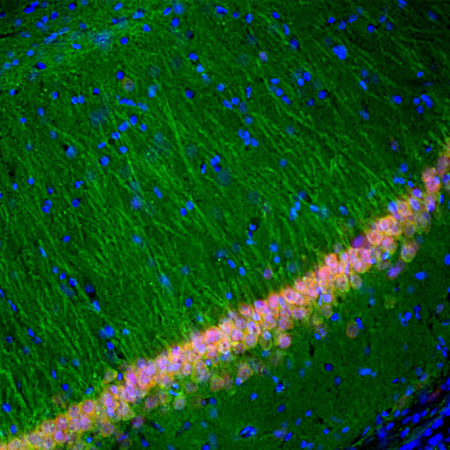
Mouse Monoclonal Antibody to UCHL1
$120.00 – $800.00
Cat# MCA-BH7Select options This product has multiple variants. The options may be chosen on the product page -
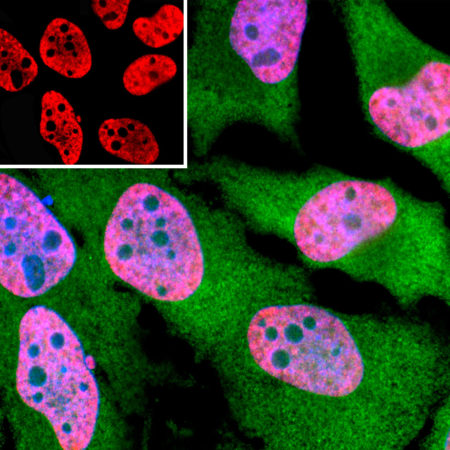
Mouse Monoclonal Antibody to TAF15
$120.00 – $800.00
Cat# MCA-4D71Select options This product has multiple variants. The options may be chosen on the product page -
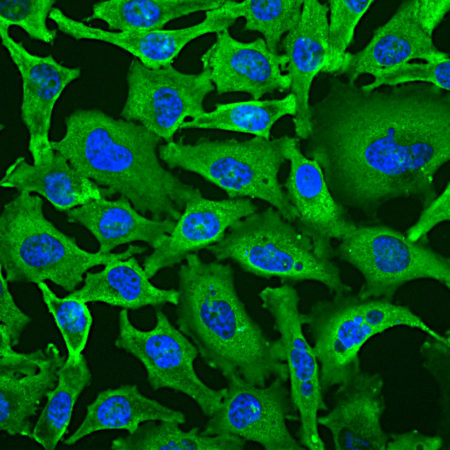
Mouse Monoclonal Antibody to GAPDH
$120.00 – $800.00
Cat# MCA-1D4Select options This product has multiple variants. The options may be chosen on the product page
Contact info
EnCor Biotechnology Inc.
4949 SW 41st Boulevard, Ste 40
Gainesville
Florida 32608 USA
Phone: (352) 372 7022
Fax: (352) 372 7066
E-mail: admin@encorbio.com


